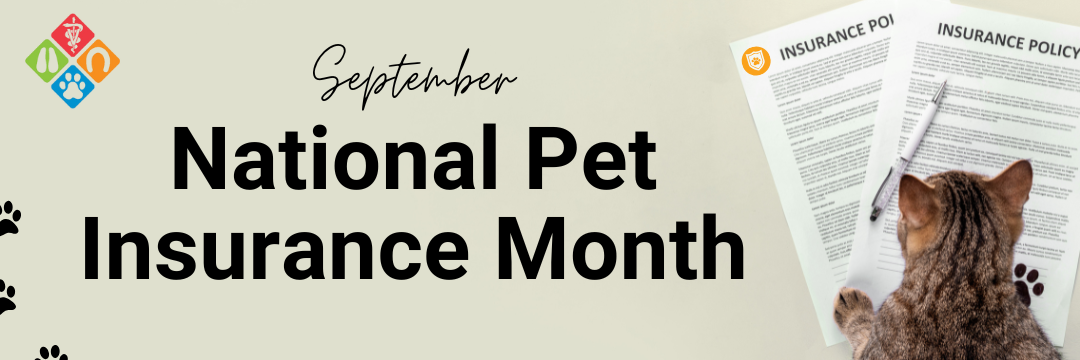September is National Pet Insurance Month, making it the perfect time to talk about a topic that can make a world of difference in your pet’s health—and your wallet.
As pet parents, we want to give our dogs and cats the very best. From annual checkups and vaccines to emergency surgeries or unexpected illnesses, veterinary care is an important part of keeping our pets happy and healthy. But we also know that costs can sometimes feel overwhelming, especially when emergencies arise. That’s where pet insurance comes in.
Why Consider Pet Insurance?
Life with pets is full of surprises—sometimes joyful, sometimes challenging. From sudden accidents to chronic illnesses, veterinary care can add up quickly.
Companies like CareCredit, Scratch Pay, and Cherry allow payment options and are life-changing for many families, however, pet insurance can provide a different type of peace of mind by helping families afford the care their pets need, whether it’s routine wellness or an unexpected emergency.
Peace of Mind in Emergencies: Pets don’t plan accidents or illnesses, but they happen. Insurance helps cover unexpected costs, so families can focus on their pet’s care instead of finances.
Financial Protection: Emergency surgeries, advanced diagnostics, or treatments for chronic illnesses can add up quickly. Insurance helps offset those costs when they happen and makes quality care more affordable.
Better Access to Care: With insurance, families are more likely to approve important diagnostics or treatments because the financial burden is reduced and reimbursed. That often means earlier detection and intervention, quicker recovery, and better outcomes for pets.
Customized to Family Needs: Plans can be tailored based on the provider. Some families choose wellness coverage to help with routine visits and vaccines, while others want accident/illness coverage for peace of mind against the unexpected. Some may choose both.
Long-Term Value: Pets are living longer thanks to modern veterinary care. Insurance helps families budget for lifelong needs, from puppy and kitten check ups to senior care.
Protecting Every Member of the Family: For many, pets are family. Insurance helps ensure they get the same thoughtful consideration as any other loved one when it comes to health care.

Pet insurance can help cover the costs of veterinary care, depending on the plan you choose. Each is different and may be customizable to fit your family’s needs and can include:
Wellness care – things like exams, vaccines, and routine lab work.
Accidents and emergencies – coverage for injuries or urgent medical needs.
Chronic conditions – ongoing care for illnesses like diabetes, allergies, or arthritis.
Unexpected illnesses – such as cancer, infections, or digestive problems.
What your insurance provider covers and the costs associated are always among the most important questions we recommend asking when shopping for a plan for your pet, so be sure to include this in all conversations when speaking with providers.
The Benefits We See in Our Clinic
At Scott County Veterinary Clinic, we’ve seen firsthand how pet insurance can positively impact both pets and their families. When insurance helps offset costs, pet parents are often able to say “yes” to diagnostics, treatments, or procedures that might otherwise have felt financially out of reach. That means healthier pets, quicker recoveries, and less stress for families during difficult times.
Most often, this supplements families through reimbursement post-visit, but some insurance plans may offer a different approach or have specialty programs like Nationwide VA Support.
Companies Our Clients Have Used
There are many insurance providers out there, and while we don’t recommend one in particular, here are some of the companies we’ve seen our clients successfully use for their pets:
– Nationwide
– MetLife Pet Insurance
– Pet’s Best
– FIGO
…and many more!
Each company offers different plan types, coverage levels, and pricing, so it’s important to explore which one aligns best with your family’s needs. All the details from submitting claims to reimbursement time frames vary between companies, too.

How to Choose the Right Plan
Shopping for insurance can feel overwhelming, but asking the right questions makes it easier. Consider:
Coverage type: Do you want accident-only, accident & illness, or wellness coverage?
Is chronic illness coverage included and/or offered?
Reimbursement rate: How much of your bill will the insurance cover after your deductible? Are there different rates for each type of coverage, like vaccines, exams and emergency care?
Per-incident or Life-time limit?
Deductible amount: Higher deductibles usually mean lower monthly payments, and vice versa.
Initial Waiting Periods: How soon after signing up can you utilize your policy for your pet?
Exclusions: Always check for conditions that may not be covered, such as pre-existing illnesses. Does this policy have breed-specific exclusions?
Policy Cancellation and Renewal Options.
A Helpful Tool: Pawlicy Advisor
Many of our clients, as well as our team, have also found Pawlicy Advisor to be a great resource. It’s a free online tool that allows you to compare different plans side by side and find one that fits your pet’s needs—and your family’s budget. Visit www.pawlicy.com to get started.
Final Thoughts
Pet insurance isn’t a one-size-fits-all solution, but it can be a powerful way to protect both your pet’s health and your peace of mind. If you’ve ever wondered whether pet insurance might be right for your family, now is a great time to explore your options.
Have questions? Give us a call at 502-863-5548 or ask us at your pet’s next appointment—we’re always happy to help guide you in the right direction!
Scott County Veterinary Clinic – Caring for pets, supporting families.

